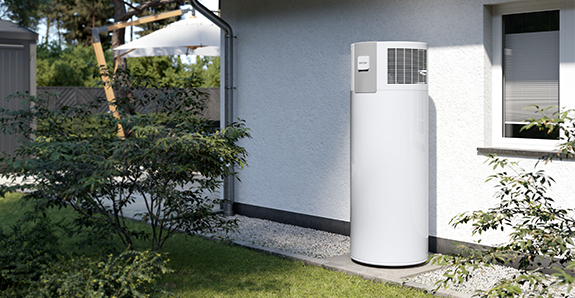Heat Pumps
Understanding heat pumps and energy sources
Innovative design with STIEBEL ELTRON heat pumps
What is a heat pump? It’s simpler than you think.
Heat pumps harness energy from natural sources like air, water, or the ground and convert it into heating energy for your home. When combined with a domestic hot water system, they offer a reliable supply of hot water. The renewable energy sourced from the air, water, and ground is abundant and sustainable, ensuring a dependable energy supply. STIEBEL ELTRON offers a wide range of highly efficient heat pumps for heating, cooling, and hot water—ideal for any type of building, whether it’s a new construction or a renovation project.

How do heat pumps work?
Heat pumps convert environmental energy into usable heat for your home. The process starts when a heat exchanger (evaporator) absorbs heat from the ground or outdoor air, transferring it to a refrigerant. The refrigerant is then compressed to increase its temperature, making it suitable for heating your home or supplying hot water via a second heat exchanger (condenser).
Depending on the source, one part electrical energy can generate up to five parts heating energy. Heat pumps can efficiently raise temperatures between -20°C and +35°C to provide comfortable warmth and hot water. With the right system in place, you can maximise renewable energy and reduce your reliance on fossil fuels. Our tailored services ensure you get the best performance from your heat pump, with professional installation and a five-year warranty for peace of mind.
Which energy source powers your heat pump?

Heat pumps using air as an energy source
Air
Air is one of the most accessible and renewable energy sources. Even during winter, when outdoor temperatures drop to -20°C, STIEBEL ELTRON’s air source heat pumps can still extract enough heat to keep your home warm. One of the key benefits of air source heat pumps is their ease of installation, as they require no extensive groundwork or drilling, making them an efficient and cost-effective solution for most properties.
All air source heat pumpsGround
Geothermal heat pumps utilise underground heat through a system of pipes filled with eco-friendly brine. This brine transfers heat to the heat pump. Depending on your site, pipes can be installed vertically in deep boreholes or laid horizontally just below the surface. Vertical installations save space, while horizontal collectors require a larger surface area. Geothermal systems offer high efficiency and are nearly maintenance-free, making them an excellent choice for properties with the necessary land.
All geothermal heat pumps
Geothermal collector (left) and vertical probe (right) as energy sources

Heat pumps using groundwater as an energy source
Water
Groundwater stores solar heat and maintains a steady temperature of +7°C to +12°C, even in winter. This consistency ensures that water source heat pumps deliver reliable performance year-round. However, sufficient groundwater availability is essential, and drilling a delivery and return well is required. If conditions are suitable, this can be an incredibly efficient heating solution.
All water source heat pumpsHeat pump comparison
Different heat pumps use different energy sources, each with its unique advantages. Use this comparison to find the best heat pump for your needs based on power generation, installation, and maintenance requirements.



